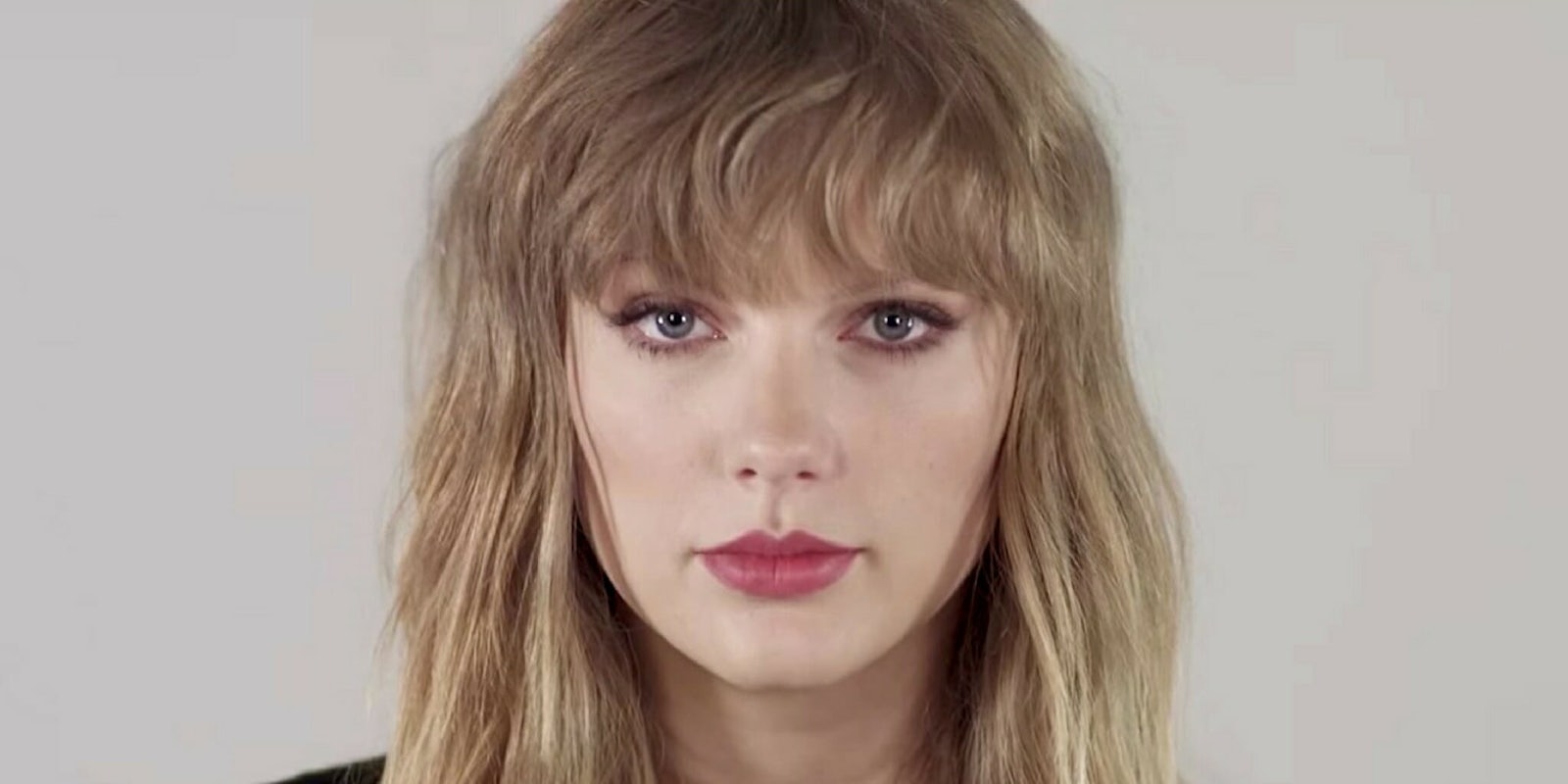In September, Taylor Swift testified in court about the radio host who groped her during a photo op in 2013, all for a symbolic $1 in damages to show that women deserve to be believed. For her part in 2017’s reckoning of abusive, powerful men, Time included Swift within the “silence breakers” it deemed as its Person of the Year, even obtaining Swift’s first interview since the trial.
“My advice is that you not blame yourself and do not accept the blame others will try to place on you,” Swift said in her interview. “You should not be blamed for waiting 15 minutes or 15 days or 15 years to report sexual assault or harassment, or for the outcome of what happens to a person after he or she makes the choice to sexually harass or assault you.”
However, much like Swift’s trial, critics too have found her inclusion as Person of the Year to be that—purely symbolic.
During President Donald Trump‘s campaign, election, and first year of presidency, Swift has remained largely apolitical and continued to do so during her interview. On Twitter, users criticized Time reporters for not asking Swift about Trump, who has faced more than 10 accusations of sexual harassment and assault himself.
“I am so disappointed you would ask why Taylor is on the cover of TIME.”
— Luvvie (@Luvvie) December 6, 2017
Well *I* am disappointed that Taylor is being positioned as voice of a movement b/c she won a lawsuit and lost nothing when others have lost everything when they break silence, but don’t get visibility.
Thank you Tarana Burke, Terry Crews, and all of the silence breakers for everything you’ve done. Taylor Swift and Megyn Kelly are considered to be on equal footing, and that’s okay today. https://t.co/wL8itpsjBI
— Evette Dionne (@freeblackgirl) December 6, 2017
https://twitter.com/alyssabereznak/status/938418354800484362
https://twitter.com/MarlowNYC/status/938422220640215041
Um why the fuck is Taylor Swift, a woman who has stayed silent on MYRIAD political issues, on the TIME Silence Breakers cover
— Ej Dickson (@ejdickson) December 6, 2017
https://twitter.com/Femmefeministe/status/938447939147530241
https://twitter.com/joannarothkopf/status/938419960879206400
But…the #metoo hashtag was started by Tarana Burke, a BLACK woman, over a decade ago…why isn’t she on the cover? Why Taylor?
— Tiffany D. Jackson (@WriteinBK) December 6, 2017
It’s exhausting that a white woman’s whimper is deemed louder than a black woman’s scream.
Critics also took issue with Megyn Kelly’s inclusion, which appeared to legitimize her past as a conservative Fox News host. Along with Swift’s place as Person of the Year, people voiced their concerns in how the two women were put on the same level as Tarana Burke and Sandra Muller, women of color who had done work to respectively develop and internationally boost #MeToo movement, yet had previously enabled of ignored systems that oppress women of color.
It is unconscionable that @time included Megyn Kelly in the #PersonOfTheYear story, and yet another reminder of how the persistently violent nature of white women’s racism is ignored over and over again. No days off from calling that out.
— Jamilah Lemieux (@JamilahLemieux) December 6, 2017
https://twitter.com/freeblackgirl/status/938420697763684352
I was having a good time and vibing with The Silence Breakers piece until that Megyn Kelly kicker tbh. That “What if we didn’t whine” part has me like 🙄🙄🙄
— ks (@Kathriller) December 6, 2017
Noticeably absent from this list of women, however, were former Fox News host Gretchen Carlson, who had taken down Fox chairman Roger Ailes in 2016, and Kesha. As journalist Yashar Ali pointed out, Carlson’s voice helped upend Ailes and subsequently former host Bill O’Reilly from the network, leading journalists to follow tales on Harvey Weinstein, and other powerful men who have since been ousted from their industries through October and November. As for Kesha, her years-long struggle against her producer and alleged abuser, Dr. Luke, and her comeback with Rainbow and powerful single “Praying,” somehow missed Time‘s parameters for a “silence breaker.”
https://twitter.com/mckinneykelsey/status/938421270076563456
https://twitter.com/QueerXiChisme/status/938477110057779200
I’m really disappointed that Time did not mention @GretchenCarlson in their story. She bravely took on Roger Ailes and ignited a national conversation. The NYT would not have done their Bill O’Reilly story if it weren’t for her…which led to their Weinstein investigation. https://t.co/y3BhQeT3JN
— Yashar Ali 🐘 (@yashar) December 6, 2017
2. And today @GretchenCarlson is in DC introducing legislation to deal with the terrible arbitration clauses that prevent women from getting the justice they deserve when they’ve been victims of sexual misconduct int he workplace. I’m so proud of you Gretchen.
— Yashar Ali 🐘 (@yashar) December 6, 2017
Swift’s inclusion, however, isn’t a problem for some. Supporters of the artist’s experience instead see the criticism as an attempt to invalidate Swift’s own assault instead of a critique of her lack of history in politically advocating for others.
taylor swift is a victim of sexual assault. she came forward, she went to court when the man who groped her tried to victim-blame her, & stood up for millions of victims of sexual assault. you don’t get to invalidate her experiences just because you don’t like her or her music. pic.twitter.com/0DDBrXC660
— brittany (@mogirlprobs) December 6, 2017
Don’t fucking making fun of Taylor Swift & minimize her experience with harassment. I’m getting sick of the torch & pitchfork hate on her. You’re right, she didn’t post about #MeToo on social. Instead, she took a man to court and sued him for 1 fucking dollar to prove a point.
— Jill Gutowitz (@jillboard) December 6, 2017
To be sure, Swift’s experiences and championship of other sexual assault survivors is very valid, and very real. On the stand, Swift finally made a political statement, helping young fans to feel emboldened to speak out against men who belittle or violate them. That cannot be undermined, even in respect to the nuance of her public persona. However, it’s important to acknowledge that this nuance does exist, and that Swift’s overarching silence speaks volumes about how she views other issues faced by women of races and classes that are different from her own.


